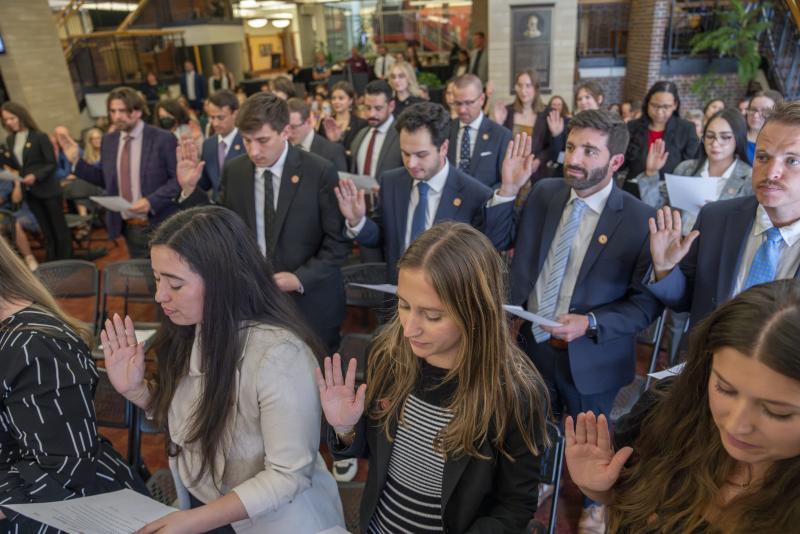Celebrating 120 Years of Clinical Programs at DU
The Student Law Office at Sturm College of Law, one of the oldest in the nation, educates tomorrow's brightest attorneys through experiential learning.

A group of Sturm law students hold up their right hands as they are sworn in as new student attorneys for the Student Law Office.
When you think of attorneys, you might envision the courtroom sharks that we see depicted in popular culture—aggressive lawyers who stop at nothing to win, hounding witnesses during cross-examinations and making passionate closing arguments to juries.
But there’s more than one way to be an attorney, and at Sturm College of Law, students get the opportunity to figure out not only what kind of attorney they want to be but also what area of law they want to work in, thanks to the Student Law Office (SLO), which this year celebrates its 120th anniversary.
In the SLO’s seven main clinics—Advancing Social Change, Civil Litigation, Civil Rights, Community Economic Development, Criminal Defense, Environmental Law, and Immigration Law and Policy—students get hands-on legal training in real-life legal disputes, supervised by faculty who are licensed to practice law.
One way to think of the SLO, says associate professor Lindsey Webb, is like Sturm’s very own law firm. Webb is the Ronald V. Yegge Clinical Director at the Sturm College of Law and oversees the SLO’s clinical legal education program.
“Like a medical student learns how to be a doctor by actually having patients under very careful supervision, law students are learning how to be lawyers by representing clients under very careful, in-house faculty supervision,” she says.
Students who are interested in being part of the clinics go through a rigorous application and interview process. Those who are selected take part in semester-long courses that are taught by the clinic’s faculty advisor, in addition to “working” for clients.
Ariell Bachman is a third-year law student at Sturm. Last year, she took part in the Advancing Social Change Clinic, which is a non-litigation clinic that Webb started several years ago in order to give part-time or nontraditional law students the opportunity to participate in a clinic.
The other six clinics are litigation focused, meaning that participants have to have the scheduling flexibility to make it to court during the week or meet with clients during the day, which can be difficult or even impossible for students who aren’t taking law classes full time.
The Advancing Social Change Clinic is also unique in that it focuses on “movement lawyering,” a nontraditional approach to law in which attorneys work with community organizations to help create social and economic change.
In the clinic, Bachman was paired with two other law students, and the group was assigned to a local nonprofit.
“Just as in any normal client-attorney relationship, we talked to them about, ‘What are your goals? How can we help you?’ We met with them, worked as a team and met with our clinical supervisor, Lindsey [Webb], weekly, in order to get guidance about what we're doing,” Bachman says.
“[Webb] really wanted us to think about how lawyers can wear multiple hats,” Bachman says. “The lawyer that you see on TV, on ‘Law and Order,’ or in movies, is not the only version of a lawyer. Lawyers can do a lot of different things for a lot of different people, and in big social movements, social justice movements, lawyers can be servants to the members of those communities who are trying to make change.”
Bachman says the clinic helped her see how she fit into the world of lawyering. As a former teacher, she didn’t know if her personality would lend itself to being a successful attorney, based on what she assumed was the reality of working in law.
“The reason the clinic experience was so meaningful is it showed me that there is a space for me,” she says. “It showed me that there are so many other options to make change with a law degree, which was really cool.”
The Student Law Office and the clinical programs aren’t just good for law students but are also a valuable asset to the Denver community, Bachman says.
“[We’re] trying to figure out different creative solutions to the access-to-justice problem that the Denver community, all of Colorado—rural and in the urban corridor—face, and how people can more equitably resolve their issues through courts,” she says.
Bachman found her time in the clinic so meaningful that it spurred her to apply for another one: the Civil Litigation Clinic. After graduation, she’s planning to be a judicial law clerk and would eventually like to go into education law, advocating for students and families.
“I feel like [the clinical programs] are a crown jewel of DU, and I wish every student did a clinic, because it has been so impactful to my learning and growth as both a burgeoning lawyer and as a person, shaping my professional identity and who I am and want to be,” Bachman says. “I couldn't even imagine graduating law school without having done these types of practical experiences.”





